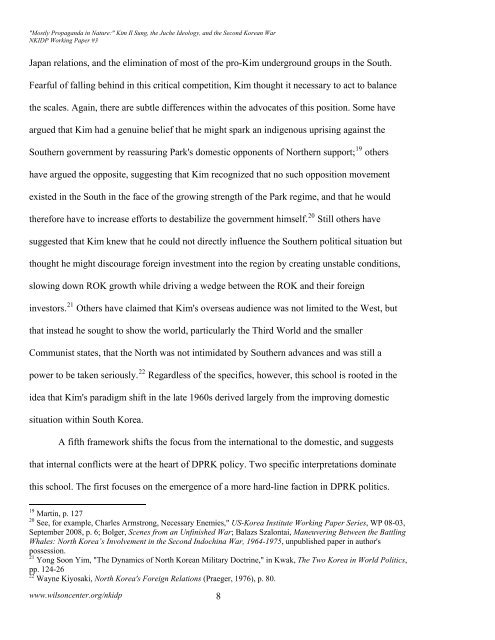"Mostly Propaganda in Nature:" Kim Il Sung, the Juche Ideology, and ...
"Mostly Propaganda in Nature:" Kim Il Sung, the Juche Ideology, and ...
"Mostly Propaganda in Nature:" Kim Il Sung, the Juche Ideology, and ...
You also want an ePaper? Increase the reach of your titles
YUMPU automatically turns print PDFs into web optimized ePapers that Google loves.
"<strong>Mostly</strong> <strong>Propag<strong>and</strong>a</strong> <strong>in</strong> <strong>Nature</strong>:" <strong>Kim</strong> <strong>Il</strong> <strong>Sung</strong>, <strong>the</strong> <strong>Juche</strong> <strong>Ideology</strong>, <strong>and</strong> <strong>the</strong> Second Korean War<br />
NKIDP Work<strong>in</strong>g Paper #3<br />
Japan relations, <strong>and</strong> <strong>the</strong> elim<strong>in</strong>ation of most of <strong>the</strong> pro-<strong>Kim</strong> underground groups <strong>in</strong> <strong>the</strong> South.<br />
Fearful of fall<strong>in</strong>g beh<strong>in</strong>d <strong>in</strong> this critical competition, <strong>Kim</strong> thought it necessary to act to balance<br />
<strong>the</strong> scales. Aga<strong>in</strong>, <strong>the</strong>re are subtle differences with<strong>in</strong> <strong>the</strong> advocates of this position. Some have<br />
argued that <strong>Kim</strong> had a genu<strong>in</strong>e belief that he might spark an <strong>in</strong>digenous upris<strong>in</strong>g aga<strong>in</strong>st <strong>the</strong><br />
Sou<strong>the</strong>rn government by reassur<strong>in</strong>g Park's domestic opponents of Nor<strong>the</strong>rn support; 19 o<strong>the</strong>rs<br />
have argued <strong>the</strong> opposite, suggest<strong>in</strong>g that <strong>Kim</strong> recognized that no such opposition movement<br />
existed <strong>in</strong> <strong>the</strong> South <strong>in</strong> <strong>the</strong> face of <strong>the</strong> grow<strong>in</strong>g strength of <strong>the</strong> Park regime, <strong>and</strong> that he would<br />
<strong>the</strong>refore have to <strong>in</strong>crease efforts to destabilize <strong>the</strong> government himself. 20 Still o<strong>the</strong>rs have<br />
suggested that <strong>Kim</strong> knew that he could not directly <strong>in</strong>fluence <strong>the</strong> Sou<strong>the</strong>rn political situation but<br />
thought he might discourage foreign <strong>in</strong>vestment <strong>in</strong>to <strong>the</strong> region by creat<strong>in</strong>g unstable conditions,<br />
slow<strong>in</strong>g down ROK growth while driv<strong>in</strong>g a wedge between <strong>the</strong> ROK <strong>and</strong> <strong>the</strong>ir foreign<br />
<strong>in</strong>vestors. 21 O<strong>the</strong>rs have claimed that <strong>Kim</strong>'s overseas audience was not limited to <strong>the</strong> West, but<br />
that <strong>in</strong>stead he sought to show <strong>the</strong> world, particularly <strong>the</strong> Third World <strong>and</strong> <strong>the</strong> smaller<br />
Communist states, that <strong>the</strong> North was not <strong>in</strong>timidated by Sou<strong>the</strong>rn advances <strong>and</strong> was still a<br />
power to be taken seriously. 22 Regardless of <strong>the</strong> specifics, however, this school is rooted <strong>in</strong> <strong>the</strong><br />
idea that <strong>Kim</strong>'s paradigm shift <strong>in</strong> <strong>the</strong> late 1960s derived largely from <strong>the</strong> improv<strong>in</strong>g domestic<br />
situation with<strong>in</strong> South Korea.<br />
A fifth framework shifts <strong>the</strong> focus from <strong>the</strong> <strong>in</strong>ternational to <strong>the</strong> domestic, <strong>and</strong> suggests<br />
that <strong>in</strong>ternal conflicts were at <strong>the</strong> heart of DPRK policy. Two specific <strong>in</strong>terpretations dom<strong>in</strong>ate<br />
this school. The first focuses on<br />
<strong>the</strong> emergence of a more hard-l<strong>in</strong>e faction <strong>in</strong> DPRK politics.<br />
19<br />
Mart<strong>in</strong>, p. 127<br />
20<br />
See, for example, Charles Armstrong, Necessary Enemies," US-Korea Institute Work<strong>in</strong>g Paper Series, WP 08-03,<br />
September 2008, p. 6; Bolger, Scenes from an Unf<strong>in</strong>ished War; Balazs Szalontai, Maneuver<strong>in</strong>g Between <strong>the</strong> Battl<strong>in</strong>g<br />
Whales: North Korea’s Involvement <strong>in</strong> <strong>the</strong> Second Indoch<strong>in</strong>a War, 1964-1975, unpublished paper <strong>in</strong> author's<br />
possession.<br />
21<br />
Yong Soon Yim, "The Dynamics of North Korean Military Doctr<strong>in</strong>e," <strong>in</strong> Kwak, The Two Korea <strong>in</strong> World Politics,<br />
pp. 124-26<br />
22<br />
Wayne Kiyosaki, North Korea's Foreign Relations (Praeger, 1976), p. 80.<br />
www.wilsoncenter.org/nkidp<br />
8

















